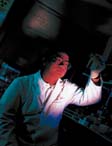 From
big lizards to astrocytomas Several years, many experiments and a million what-ifs later, Cala arrived at his current area of research: the sodium-proton exchanger in tumor growth and proliferation. Cells that thrive in an oxygen-deprived environment - notably, cancer cells - have increased rates of hydrogen production. "Tumor cells are greedy; they generate lots of hydrogen," says Cala. "It is essential that they get rid of these hydrogen ions efficiently if they are to continue to rely upon anaerobic metabolism." But if researchers could jerry-rig the sodium-proton exchanger to make cancer cells go acidic, they might be able to interfere with their viability. Or so Cala thought. In work that Cala's lab is about to publish, Anderson, graduate student Lee Anne McLean and professor of neurology Fred Gorin inhibited the sodium proton exchanger in normal brain cells (astrocytes) from rats and malignant glioma cells from cancer patients. Just as they hypothesized, the intracellular environment became acidic. The tumor cells died while the healthy cells were unharmed. The next phase of studies has just begun. Cala and his co-workers are performing animal studies involving a little-used diuretic that inhibits the sodium-proton exchanger. They want to see if inhibiting the sodium-proton exchange alters tumor growth in animals. "I'd been interested in exploring whether inhibiting the sodium-proton exchange might be lethal to glial tumor cells and dilly-dallying around with this project for years," Cala says. "But Lazaro's death finally got me off the dime." Of course, the road from promising studies to effective treatments is filled with detours, stalls, and unfulfilled expectations. Back at his laboratory, Cala watches the microscopic reactions of glial cells to the sodium proton exchanger, takes a breath and waits - a lasting homage to an old friend.
Home |
Table of Contents |
To our Readers |
Building on Basics UC Davis Health System | © 2000, 2001, 2002 UC Regents. All rights reserved. |
Post-graduate researcher Hieu Pham looks at red blood cells from a giant salamander. |

